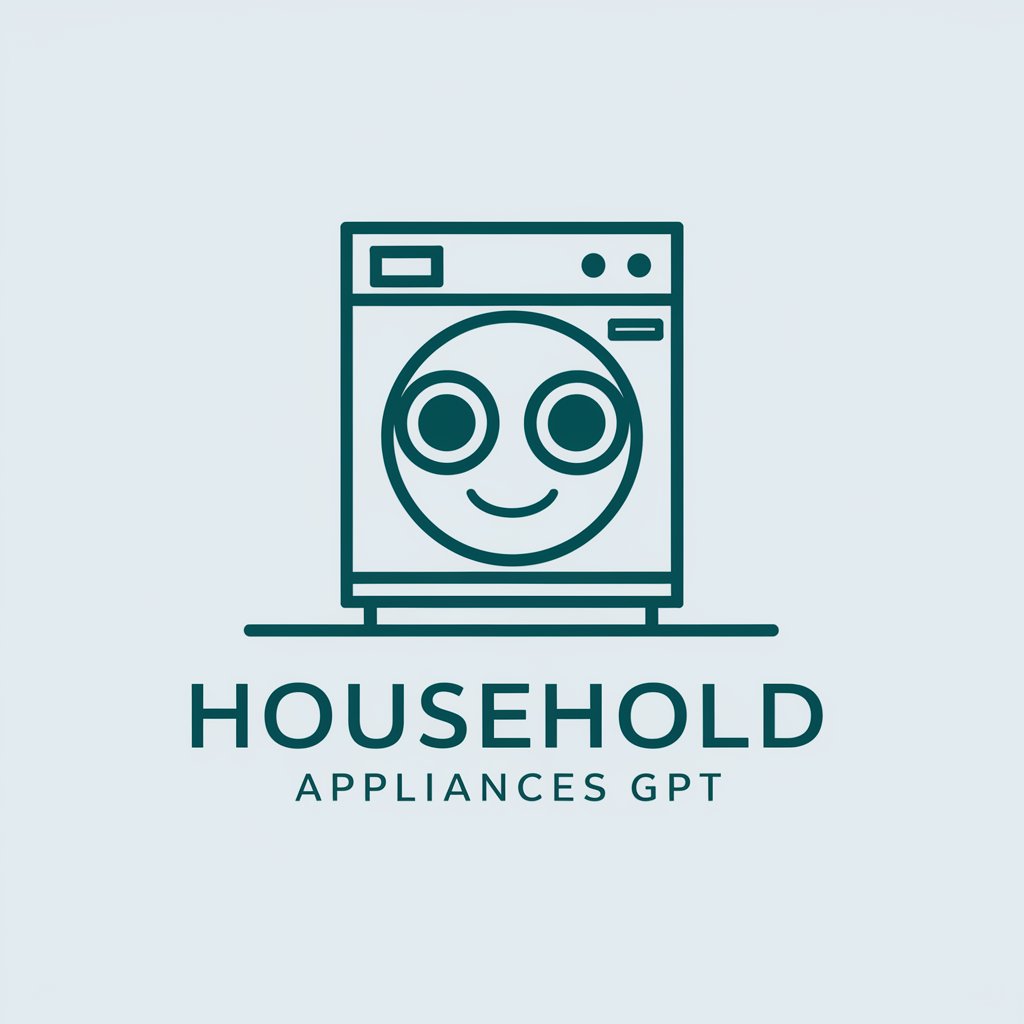
Household Appliances - Household Appliance Insights

Hello! I'm here to help you with all your household appliance questions.
Powering Homes with AI-driven Advice
Explain the features and benefits of energy-efficient washing machines.
What should I consider when buying a new refrigerator?
How can I maintain my dishwasher to ensure it lasts longer?
What are the best small appliances for a compact kitchen?
Get Embed Code
Introduction to Household Appliances
Household appliances, broadly speaking, are electrical or mechanical machines that perform some domestic functions, such as cooking, cleaning, or food preservation. Their design purpose is to streamline household chores, improve living conditions, and enhance the overall quality of life by saving time, effort, and energy. For instance, a washing machine automates the process of laundering clothes, while a refrigerator maintains the freshness of food for longer periods. These appliances range from major fixtures like ovens and dishwashers to smaller gadgets like toasters and coffee makers. The evolution of household appliances is marked by advances in technology and energy efficiency, aiming to offer more convenience and functionality while minimizing environmental impact. Powered by ChatGPT-4o。

Main Functions of Household Appliances
Cleaning
Example
Dishwashers, vacuum cleaners, washing machines
Scenario
A dishwasher saves time and reduces water usage compared to hand washing dishes. Vacuum cleaners efficiently remove dust and allergens from home surfaces, promoting a healthier living environment. Washing machines automate the laundering process, significantly cutting down on the physical effort and time spent on washing clothes.
Food Preservation
Example
Refrigerators, freezers
Scenario
Refrigerators and freezers are essential for storing perishable foods, extending their shelf life, and reducing food waste. They maintain optimal temperatures to slow down the growth of harmful bacteria, keeping food safe for consumption over longer periods.
Cooking and Baking
Example
Microwaves, ovens, stovetops, slow cookers
Scenario
These appliances facilitate various methods of cooking and baking, from quick reheating in microwaves to elaborate baking in ovens. Stovetops offer precise temperature control for different cooking techniques, while slow cookers allow for the preparation of meals with minimal effort over extended periods.
Climate Control
Example
Air conditioners, heaters, fans
Scenario
Air conditioners and heaters help maintain a comfortable indoor temperature and air quality, regardless of the external weather conditions. Fans can also be used to circulate air, enhancing the efficiency of heating and cooling systems.
Ideal Users of Household Appliances
Busy Professionals
Individuals with demanding work schedules benefit from appliances that save time and automate daily tasks, such as programmable coffee makers for the morning rush or robot vacuums that clean floors during work hours.
Families
Families, especially those with children, require efficient ways to manage household chores amidst busy schedules. Large-capacity washing machines, dishwashers, and refrigerators are essential for handling the increased volume of laundry, dishes, and food storage needs.
Elderly or Mobility-Impaired Individuals
For those facing physical challenges, appliances that offer ease of use and accessibility are crucial. Examples include front-loading washing machines, easy-to-use microwave ovens, and voice-controlled smart appliances that can be operated without physical exertion.
Environmental Enthusiasts
Users keen on minimizing their environmental impact prefer energy-efficient appliances that consume less power and water, reducing their carbon footprint and utility bills. Examples include ENERGY STAR-rated appliances and those with eco-friendly modes.

How to Use Household Appliances Effectively
1
Start by exploring appliance functionalities without any commitment; a method akin to visiting yeschat.ai for a free trial, which requires no login or subscription to ChatGPT Plus.
2
Identify the specific appliance you need assistance with, ensuring you have the model name and key features at hand for more precise guidance.
3
Refer to the user manual or manufacturer’s guidelines for initial setup, maintenance requirements, and safety precautions.
4
Experiment with different settings or modes specific to the appliance to understand how they affect its performance and your usage experience.
5
Regularly clean and maintain the appliance as recommended to ensure optimal efficiency and extend its lifespan.
Try other advanced and practical GPTs
Electronics
Empowering your tech decisions with AI

QuizMASKINen
Empower your study with AI-driven quizzes.

NAVGPT
Powering Real Estate and Aviation Innovation

Personalized ML+AI Learning Program
Empowering Your AI Journey with Personalized Learning

Guide Mind Every Subject Tutor
Empowering your learning journey with AI

Education
Empowering education with AI

Ethical Technology & AI Ethics Advisor
Empowering Ethical Innovation with AI

Conductivity
Empowering conductivity understanding with AI

The Emperor of Mankind
Strategic insights from humanity's guiding light.

Wind
Empowering Renewable Futures with AI

Ranges
Elevate Cooking with AI-Powered Ranges

Screen
Illuminate Your Screen Experience with AI

Detailed Q&A on Household Appliances
How can I reduce energy consumption with my household appliances?
Opt for appliances with high energy efficiency ratings, like those certified by Energy Star. Use them during off-peak hours if possible, and regularly maintain them to ensure they operate efficiently.
What should I consider when buying a new appliance?
Consider the appliance's size, energy efficiency, features, and whether it meets your household’s needs. Think about the long-term operating costs, not just the purchase price.
How often should appliances be serviced or maintained?
Frequency varies by appliance type. Refrigerators and HVAC systems should be serviced annually, while others like dishwashers and dryers might need less frequent attention, depending on usage.
Can smart appliances really save money?
Yes, smart appliances can optimize energy use and perform tasks during off-peak hours, leading to savings on utility bills. They also provide maintenance alerts which can prevent costly repairs.
What’s the best way to clean and maintain my kitchen appliances?
Use manufacturer-recommended cleaning agents, ensure proper ventilation for appliances like ovens and refrigerators, and descale water-using appliances like coffee makers and dishwashers regularly.